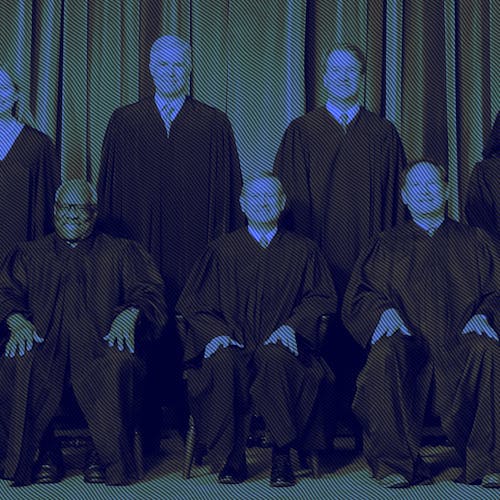O'BRIEN: Stakes clouded by fear mongering

It is perhaps unsurprising that as we approach this year’s midterm elections — the most heated in decades — political rhetoric has become increasingly hostile, combative and even outright apocalyptic. As the Democrats look to capture the House of Representatives and Republicans attempt to expand their majority in the Senate, both have dramatically escalated their messages in an attempt to fire up their bases of support. President Donald J. Trump has defended his party by absurdly claiming his Democratic opponents do not care about crime and are leading “an assault on our country,” while some of his allies have ramped up attacks even further. At an event at the Douglass Student Center on Monday night, prominent conservative activists Charlie Kirk and Candace Owens claimed the Left wants to see the destruction of Western civilization. Some Democratic activists, meanwhile, have accused the administration of authoritarian or fascist tendencies.
This rhetoric is distinctly more vicious, cynical and lacking in substance than in past cycles. National Republican leadership has resorted to portraying the opposing party as one of mobs and violence while Democratic leadership has similarly accused its opponents — either directly or implicitly — of racism and anti-immigrant sentiment. Perhaps this is why, according to a study by a group of political scientists at Georgetown University, the vast majority of voters from both parties think the other rarely or never has the interests of the country in mind. Even more shocking, approximately a third of both Democrats and Republicans perceive the opposing party to be a “very serious threat” to the United States and its people.
Of course, none of the apocalyptic claims each party is making will pan out, and those partisans looking to finally win our great decades-long culture war will surely be disappointed on the morning of Nov. 7. Florida will not, as Republican candidate Ron DeSantis claims, become the next Venezuela if his Democratic opponent Andrew Gillum is elected, nor will the federal government descend into authoritarianism if the Republican Party wins control of the House. So in an era where our leaders are being dishonest or outright lying about the stakes of our elections, how should rational people make their choices?
The answer, though unsatisfying as it may be, is to focus on ideas rather than political rhetoric. While politicians now spend so much time firing people up with cultural issues they have little power over, they also bring with them carefully crafted policy agendas with far more important consequences. From a policy perspective, next month’s elections will no doubt have real impacts on the lives of millions Americans. Between the 5 to 10 governorships Democrats could flip next month and ballot initiatives in Idaho, Nebraska and Utah, hundreds of thousands of the country’s poorest families could gain Medicaid coverage. In Florida, a ballot initiative could extend the right to vote to 1.5 million Americans who have had this right confiscated due to criminal histories. Voters across the country will also be weighing in on issues including gas taxes, redistricting reform, minimum wage increases and marijuana legalization. On the federal level, Senate Majority Leader Mitch McConnell (R-Ky.) has vowed to pursue cuts to Medicare and Social Security if his party maintains control of both houses of Congress.
Voters and elected officials are spending more of their time debating on whether either conservatives or liberals are more civil when it comes to big picture questions of tax policy or health insurance. Should our government have borrowed $1 trillion to slightly boost GDP over the next two or three years when unemployment was already near 4 percent? How can the federal government prepare for the next recession while stabilizing the debt-to-GDP ratio? What can Congress do to encourage labor force participation and raise wages for workers on the lower end of the income scale? Each of these questions is vastly more important than whether your senator supports Colin Kaepernick kneeling during the national anthem, for example, yet candidates around the country are pandering to people on these comparatively-irrelevant issues.
Have you ever consulted an economist on a policy proposal you see in the news? When was the last time you genuinely sought out expertise on an issue in the news? If your political news intake largely consists of reactionary talking heads like Ben Shapiro, Cenk Uygur or worse — politicians themselves — you are doing an incredible disservice to yourself and contributing to the nasty cultural war that is dividing our country. Instead, use the next few weeks to read up on what genuine experts on both sides of the aisle think about these critical questions and why. When you dig deeply into the specifics of a tax plan or health insurance proposal, you may be surprised to find that your candidate’s claims of the country’s imminent demise ring hollow.
Connor O'Brien is a School of Arts and Sciences senior majoring in economics. His column, "Taming Tribalism," runs on alternate Thursdays.
*Columns, cartoons and letters do not necessarily reflect the views of the Targum Publishing Company or its staff.
YOUR VOICE | The Daily Targum welcomes submissions from all readers. Due to space limitations in our print newspaper, letters to the editor must not exceed 500 words. Guest columns and commentaries must be between 700 and 850 words. All authors must include their name, phone number, class year and college affiliation or department to be considered for publication. Please submit via email to [email protected] by 4 p.m. to be considered for the following day’s publication. Columns, cartoons and letters do not necessarily reflect the views of the Targum Publishing Company or its staff.



